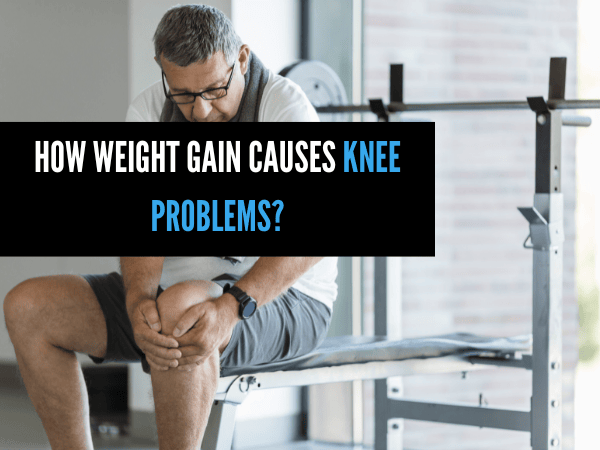How Weight Gain Causes Knee Problems?
Excessive weight gain can have far-reaching consequences on our overall health, with one significant area of impact being the knees.
As we carry excess weight, our knees bear the brunt of this additional load, leading to a variety of knee problems. These issues can range from mild discomfort to debilitating conditions that significantly affect mobility and quality of life.
By understanding Can Sudden Weight Gain Cause Knee Pain, we can begin to appreciate the importance of maintaining a healthy weight and taking proactive steps to protect our knee joints.
Contents
How Weight Gain Causes Knee Problems?
There is a strong correlation between Sudden Weight Gain And Joint Pain. The human knee is a complex joint that supports the body’s weight and allows for movement.
When a person gains weight, especially in excess, it puts additional stress on the knee joints, leading to various problems and discomfort. Weight Pressure On Knees can contribute to knee problems in several ways:
#1. Increased Stress on The Knee Joints
Overweight Knee Pain Symptoms are like additional stress on the knee joints when standing, walking, or engaging in physical activities. The knees bear the brunt of this extra load, and over time, the increased pressure can lead to wear and tear on the joint surfaces.
#2. Accelerated Cartilage Degeneration
The knee joint is lined with protective cartilage that cushions the bones and allows for smooth movement. However, excess weight can accelerate the degeneration of this cartilage.
The increased pressure on the joint can cause the cartilage to wear down more quickly, leading to conditions such as osteoarthritis.
#3. Altered Biomechanics
Weight gain can lead to changes in posture and altered walking mechanics.
For example, individuals who are overweight or obese may adopt a gait pattern that places excessive stress on the knees, increasing the risk of injuries or exacerbating existing knee conditions.
You must also read the suggested Tips to Get Rid of Back Pain!
#4. Reduced Muscle Strength
Weight gain often coincides with reduced muscle strength, particularly in the lower body. Weaker muscles can fail to adequately support the knee joint, leading to instability and an increased risk of injuries.
It’s important to note that while weight gain can contribute to knee problems, it is not the sole factor.
Other factors, such as genetics, previous injuries, and occupational or sports-related activities, can also play a role in the development of knee issues. So now you know how Does Overweight Causes Knee Pain.
That’s why managing body weight, maintaining an active lifestyle, and seeking appropriate medical care are important steps in mitigating the impact of weight gain on knee health.
Ways to Get Relief from Knee Pain Instantly
Experiencing knee problems as a result of weight gain can be quite common, as Every Pound Of Weight Pressure On Knees causes additional strain.
However, there are several Overweight Knee Pain Relief and lifestyle changes that can help alleviate knee problems associated with weight gain. Here are a few suggestions:
#1. Weight Loss
Losing weight can significantly reduce the stress on your knees. Aim for gradual and sustainable weight loss through a combination of a healthy, balanced diet and regular exercise.
#2. Low-impact Exercises
Engage in low-impact exercises that are easy on the knees, such as swimming, cycling, water aerobics, or using an elliptical machine. These activities can help strengthen the surrounding muscles without placing excessive strain on your knees.
#3. Strengthening Exercises
Strengthening the muscles around your knees can provide better support and stability. Focus on exercises that target the quadriceps (front of the thighs) and hamstrings (back of the thighs).
Examples include leg raises, hamstring curls, and squats. Consult a physical therapist for appropriate exercises tailored to your specific condition.
#4. Low-impact Aerobic Exercises
Engaging in Overweight Knee Pain Exercises, such as brisk walking or using an elliptical machine, can help improve cardiovascular health without putting excessive stress on your knees.
#5. Proper Footwear
Wearing supportive, well-fitted shoes can help distribute your weight more evenly and reduce the impact on your knees. Consider using shoe inserts or orthotics for additional support, if necessary.
#6. Hot and Cold Therapy
Applying heat or cold packs to your knees can help alleviate pain and reduce inflammation. Use a heating pad or take warm baths/showers to relax the muscles and improve blood circulation.
Alternatively, apply cold packs or ice wrapped in a cloth to reduce swelling and numb the area.
#7. Herbal Remedies
Some herbs, such as turmeric, ginger, and boswellia, are believed to have anti-inflammatory properties. Consult with a healthcare professional or herbalist before using such Remedies For Knee Pain Due To Obesity to ensure they are safe for you.
#8. Physical Therapy
If your knee problems persist or worsen, consider seeking professional help from a physical therapist. They can provide targeted exercises, manual therapy, and other techniques to improve your knee function and reduce pain.
Remember, it’s essential to consult with a healthcare professional if you’re experiencing persistent knee pain or if your weight gain is causing significant discomfort.
They can provide a proper diagnosis and recommend appropriate treatments or further interventions.
Dr. Ramakant Kumar is a leading Knee Replacement Surgeon in India. With years of experience and a passion for improving patients’ lives, he is dedicated to providing the highest quality care and personalized treatment options.
Try These Proven Methods to Relieve Knee Pain and Restore Mobility!
In this blog, Can Weight Gain Cause Knee Pain, we explain how weight gain can significantly contribute to the development of knee problems. Excess body weight puts additional strain on the knee joints, increasing pressure and accelerating wear and tear of cartilage, ligaments, and bones.
Over time, this can lead to conditions such as osteoarthritis, causing pain, stiffness, and reduced mobility. Weight gain can also affect proper knee alignment, creating abnormal stress on supporting structures and increasing the risk of chronic pain and injuries.
Maintaining a healthy weight through regular exercise, a balanced diet, and an active lifestyle is essential for preventing knee issues. For proper evaluation and long-term knee care, consulting the best orthopedic doctor in Patna can help diagnose the problem early and guide effective treatment and prevention strategies.




